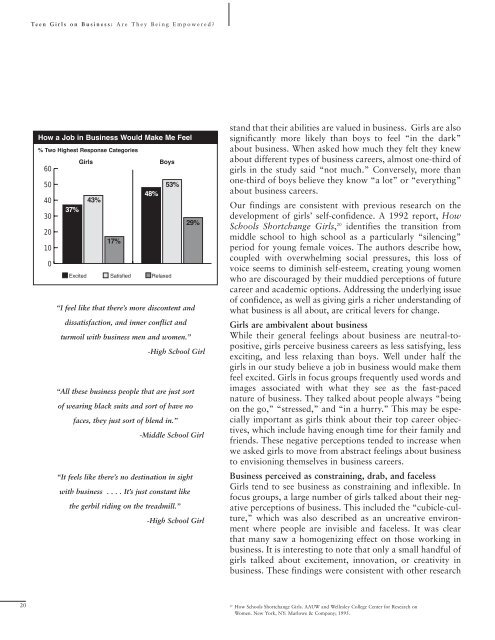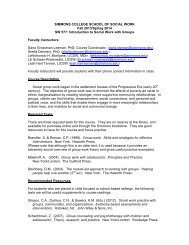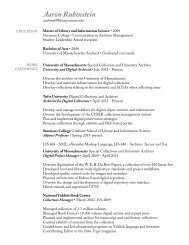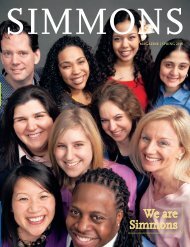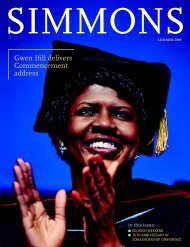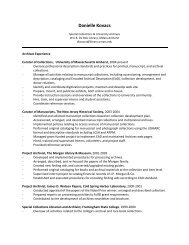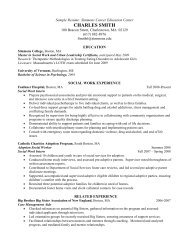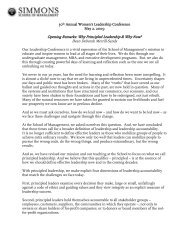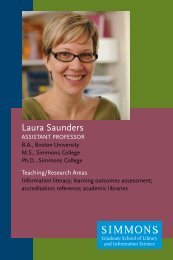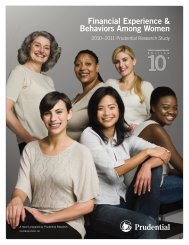Teen Girls on Business - Simmons College
Teen Girls on Business - Simmons College
Teen Girls on Business - Simmons College
Create successful ePaper yourself
Turn your PDF publications into a flip-book with our unique Google optimized e-Paper software.
<str<strong>on</strong>g>Teen</str<strong>on</strong>g> <str<strong>on</strong>g>Girls</str<strong>on</strong>g> <strong>on</strong> <strong>Business</strong>: Are They Being Empowered?How a Job in <strong>Business</strong> Would Make Me Feel% Two Highest Resp<strong>on</strong>se Categories<str<strong>on</strong>g>Girls</str<strong>on</strong>g>Boys605053%48%4043%37%3029%2017%100Excited Satisfied Relaxed“I feel like that there’s more disc<strong>on</strong>tent anddissatisfacti<strong>on</strong>, and inner c<strong>on</strong>flict andturmoil with business men and women.”-High School Girl“All these business people that are just sortof wearing black suits and sort of have nofaces, they just sort of blend in.”-Middle School Girl“It feels like there’s no destinati<strong>on</strong> in sightwith business . . . . It’s just c<strong>on</strong>stant likethe gerbil riding <strong>on</strong> the treadmill.”-High School <str<strong>on</strong>g>Girls</str<strong>on</strong>g>tand that their abilities are valued in business. <str<strong>on</strong>g>Girls</str<strong>on</strong>g> are alsosignificantly more likely than boys to feel “in the dark”about business. When asked how much they felt they knewabout different types of business careers, almost <strong>on</strong>e-third ofgirls in the study said “not much.” C<strong>on</strong>versely, more than<strong>on</strong>e-third of boys believe they know “a lot” or “everything”about business careers.Our findings are c<strong>on</strong>sistent with previous research <strong>on</strong> thedevelopment of girls’ self-c<strong>on</strong>fidence. A 1992 report, HowSchools Shortchange <str<strong>on</strong>g>Girls</str<strong>on</strong>g>, 20 identifies the transiti<strong>on</strong> frommiddle school to high school as a particularly “silencing”period for young female voices. The authors describe how,coupled with overwhelming social pressures, this loss ofvoice seems to diminish self-esteem, creating young womenwho are discouraged by their muddied percepti<strong>on</strong>s of futurecareer and academic opti<strong>on</strong>s. Addressing the underlying issueof c<strong>on</strong>fidence, as well as giving girls a richer understanding ofwhat business is all about, are critical levers for change.<str<strong>on</strong>g>Girls</str<strong>on</strong>g> are ambivalent about businessWhile their general feelings about business are neutral-topositive,girls perceive business careers as less satisfying, lessexciting, and less relaxing than boys. Well under half thegirls in our study believe a job in business would make themfeel excited. <str<strong>on</strong>g>Girls</str<strong>on</strong>g> in focus groups frequently used words andimages associated with what they see as the fast-pacednature of business. They talked about people always “being<strong>on</strong> the go,” “stressed,” and “in a hurry.” This may be especiallyimportant as girls think about their top career objectives,which include having enough time for their family andfriends. These negative percepti<strong>on</strong>s tended to increase whenwe asked girls to move from abstract feelings about businessto envisi<strong>on</strong>ing themselves in business careers.<strong>Business</strong> perceived as c<strong>on</strong>straining, drab, and faceless<str<strong>on</strong>g>Girls</str<strong>on</strong>g> tend to see business as c<strong>on</strong>straining and inflexible. Infocus groups, a large number of girls talked about their negativepercepti<strong>on</strong>s of business. This included the “cubicle-culture,”which was also described as an uncreative envir<strong>on</strong>mentwhere people are invisible and faceless. It was clearthat many saw a homogenizing effect <strong>on</strong> those working inbusiness. It is interesting to note that <strong>on</strong>ly a small handful ofgirls talked about excitement, innovati<strong>on</strong>, or creativity inbusiness. These findings were c<strong>on</strong>sistent with other research2020How Schools Shortchange <str<strong>on</strong>g>Girls</str<strong>on</strong>g>. AAUW and Wellesley <strong>College</strong> Center for Research <strong>on</strong>Women. New York, NY: Marlowe & Company; 1995.


